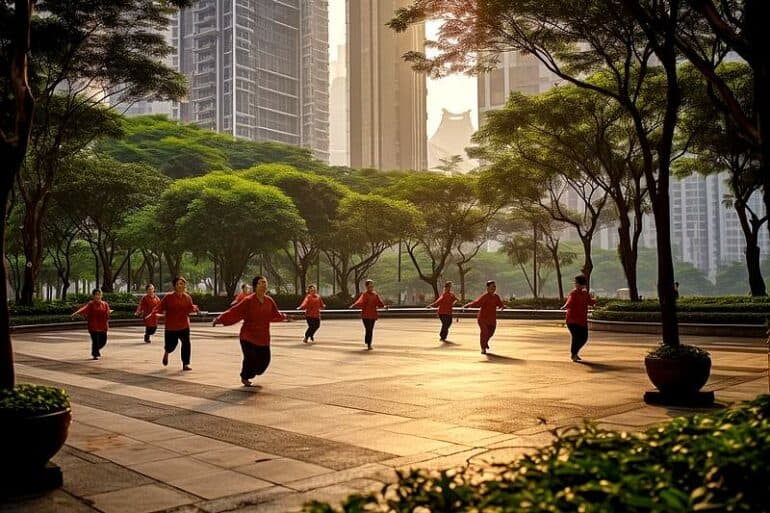Qigong is the relaxation secret from China
Qigong, often referred to as the “art of vital energy,” is a deeply rooted element of Chinese culture and medicine. Although the exact origins of this technique have been lost in the mists of time, its roots are undoubtedly ancient and go back a long way. The first pictorial representations of qigong practitioners on wall paintings and artifacts date back to the Han Dynasty. These testimonies are over two thousand years old and testify to the long tradition and importance of Qigong in Chinese history.
In ancient times, Qigong was valued not only as a method of health care, but also as a spiritual practice and means of self-improvement. It was practiced in temples, monasteries, and even in the imperial courts. The exercises, which include both exercise and meditation, were developed to harmonize and strengthen the flow of qi, or life energy, in the body.
Qi life energy of man
The term itself is still very new. It was first coined by Guizhen in the 1950s. He placed qi at the center of his descriptions. Qi stands for the life energy of man. It is one of the central categories of Asian philosophy. The ancient thinkers from the Far East used it to describe all the energy that people have carried within themselves since their existence. In their conception, everything runs in cycles, also life. Throughout the years, we take in energy and also release some – for example, when we exhale. The exercises are intended to replenish the energy balance of the human being.
Qigong Meditation – Components
Qigong traditionally consists of seven components that form a unit: Movement, Breathing, Naturalness, Calmness, Imagination, Sound and Relaxation. The slowly executed movements are therefore very diverse. If you want to dive really deep into the ancient Chinese tradition, you have to do it outdoors. Only in this way can sufficient oxygen reach the lungs and body and mind be brought into harmony. In China, large groups meet in the park, all of whom practice the techniques. Age does not matter. Both children and the elderly “do gymnastics” before they start their daily routine. In the meantime, followers of the philosophy can also be observed in Germany’s big cities.
Qigong Meditation – Courses
The technique is relatively easy to learn. All movements are easy to perform. On the net you can find numerous videos that introduce step by step the ancient Chinese art. But there are also many professionals who show beginners the technique. Here you have someone you can ask and who will correct your mistakes. You can now book such courses at all major adult education centers and private providers. The art is recognized in Germany as prevention. Check with your health insurance company to see if they will cover the cost of a course.
Qigong exercises and applicability
These exercises do not require any special effort and can be used as an adjunctive therapy. In addition, this gentle method is suitable for all ages.
These exercises can be used for:
- Back pain, joint problems and postural deformities.
- To maintain health in old age.
- Stress-related disorders such as stress, fatigue and sleep disorders.
- Headaches, irritable bowel and irritable stomach.
- For circulatory problems and high blood pressure.
Chinese Philosophy
When you practice Qigong, you are immersed in the essence of Chinese philosophy, which emphasizes harmony between man and nature. It teaches you to be present in the present moment, to be aware of your surroundings, and to connect with the surrounding energy. This state of mindfulness allows you to start your day relaxed and face challenges with renewed vitality and clarity.
Practicing outdoors is a central element of Qigong. The fresh air, gentle light of the sun, and rustling of leaves enhance the feeling of connection with nature. It is often said that the natural elements – earth, water, fire, metal, and wood – nourish and enliven the energy of the qigong practitioner.
Qigong groups have formed in many cities around the world, meeting regularly in parks and other public places. These communities provide a wonderful opportunity to practice together, share experiences, and learn from experienced teachers. Perhaps there is such a group near you that you can join to experience the deep wisdom of Chinese philosophy through qigong.

